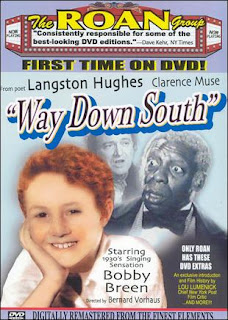Way Down South
Getting back to the films of Bernard Vorhaus, I turn to a curiosity from 1939, Way Down South. Ostensibly a vehicle for a child star, it manages to be a franker than usual look at slavery, and it was written by Clarence Muse and Langston Hughes--two black men. I can't imagine there were too many other films that could claim that at the time.
Set in an antebellum Louisiana, the plantation owned by Master Reid is a happy place to be, with the slaves all smiles. At first this seemed offensive, but what we are seeing is how Reid (Ralph Morgan) is kind to his slaves, spending more on them than is advised. By today's standards, we might think he's still holding human beings in bondage, but I guess it never occurred to them to free them.
Morgan dies, and his son (Bobby Breen) is too young to take over, so an executor (Edwin Maxwell) does. He is from the North, and doesn't understand Southern ways. He hires an overseer, who whips a slave (something Reid never did). He decides he's going to sell off the slaves, breaking up families. Breen, along with the kindly Uncle Caton (Muse), take off for New Orleans, where they are aided by a kindly innkeeper (Alan Mowbray).
It's really a weird film. On the one hand, there are several musical numbers, including Negro spirituals, and chances for Breen to show off his boy soprano voice (at one point he sings "Motherless Child"). On the other hand, it's a rare and daring depiction of blacks as human beings, though in the auspices of the stereotypes (mammy, uncle, field hand, etc.). For anyone teaching race relations throughout American cinema, it would inspire an interesting discussion.
Also in the cast is Stymie Beard, a member of Our Gang, as another stereotype, the mischievous young black boy.
Set in an antebellum Louisiana, the plantation owned by Master Reid is a happy place to be, with the slaves all smiles. At first this seemed offensive, but what we are seeing is how Reid (Ralph Morgan) is kind to his slaves, spending more on them than is advised. By today's standards, we might think he's still holding human beings in bondage, but I guess it never occurred to them to free them.
Morgan dies, and his son (Bobby Breen) is too young to take over, so an executor (Edwin Maxwell) does. He is from the North, and doesn't understand Southern ways. He hires an overseer, who whips a slave (something Reid never did). He decides he's going to sell off the slaves, breaking up families. Breen, along with the kindly Uncle Caton (Muse), take off for New Orleans, where they are aided by a kindly innkeeper (Alan Mowbray).
It's really a weird film. On the one hand, there are several musical numbers, including Negro spirituals, and chances for Breen to show off his boy soprano voice (at one point he sings "Motherless Child"). On the other hand, it's a rare and daring depiction of blacks as human beings, though in the auspices of the stereotypes (mammy, uncle, field hand, etc.). For anyone teaching race relations throughout American cinema, it would inspire an interesting discussion.
Also in the cast is Stymie Beard, a member of Our Gang, as another stereotype, the mischievous young black boy.



Comments
Post a Comment